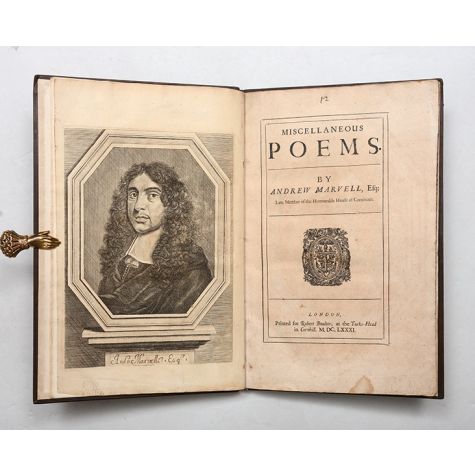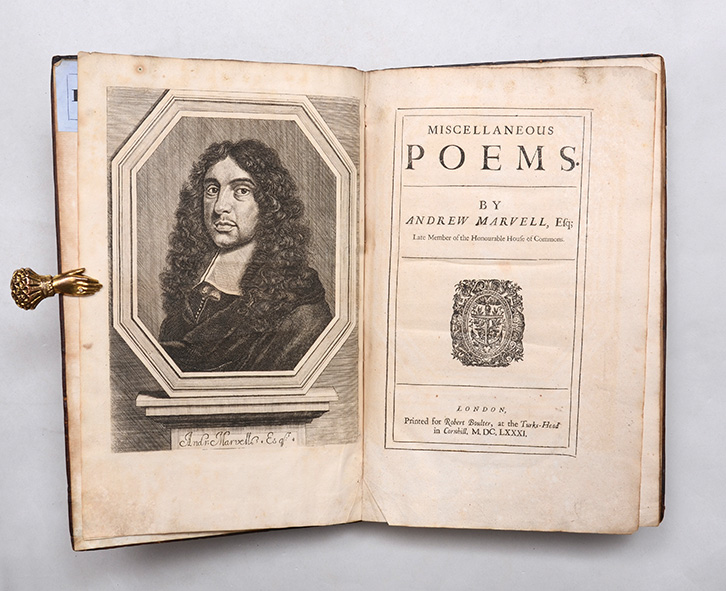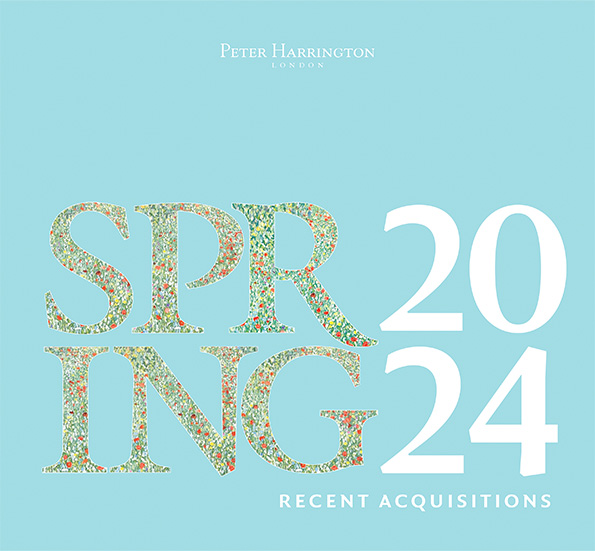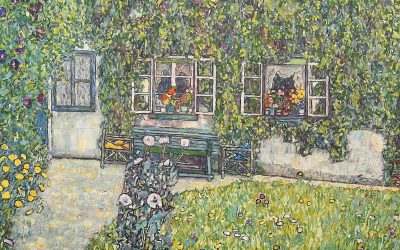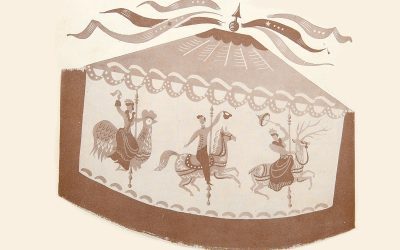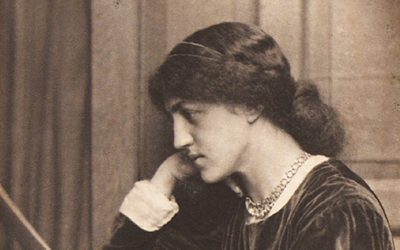DOVER STREET DIARIES: “ANDY MARVELL, WHAT A MARVEL!”
A first edition of Andrew Marvell’s Miscellaneous Poems, containing the first appearances of such poetic masterpieces as “To His Coy Mistress” and “The Garden”.
In the famous opening scene of my favourite film, Powell & Pressburger’s A Matter of Life and Death (1946), the British WWII airman played by David Niven is heard, going down over the British Channel in a shot-out Lancaster bomber, attempting to chat up an attractive-voiced radio operating girl. Their conversation goes like this:

RADIO GIRL: Request your position. Come in, Lancaster. Come in, Lancaster.
NIVEN: Position nil. Repeat, nil. Age 27 – very important. Education violently interrupted. Religion – Church of England. Politics – Conservative by nature, Labour by experience. What’s your name?
RADIO GIRL: I cannot read you. Request your position. Can you see our signals?
NIVEN: “Give me my scallop-shell of quiet, / My staff of faith to walk upon, / My scrip of joy, immortal diet, / My bottle of salvation, / My gown of glory, hope’s true gage,| And thus I’ll take my pilgrimage.” Sir Walter Raleigh wrote that. I’d rather have written that than flown through Hitler’s legs.
RADIO GIRL: I cannot understand you. Hello, Lancaster. We are sending signals. Can you see our signals? Come in, Lancaster. Come in, Lancaster.
NIVEN: …… “But at my back I always hear / Time’s winged chariot hurrying near. / And yonder all before us lie / Deserts of vast eternity.” Andy Marvell – What a marvel! What’s your name?!”
Niven is palpably doomed, has got no parachute – but he gets her name (it’s June), and in the end defies his fate and gets the girl!

How much this is down to his quoting from Andrew Marvell’s notorious chat-up poem “To His Coy Mistress” might perhaps be overestimated – but it’s got to count for something. I’ve often found the poem useful myself – and in younger days used to keep as a sort of mantra its closing lines:

I hope this extract, and the salutary lesson of David Niven’s successful encounter above, goes to assert definitively that any person who thinks that the poetry of the 17th century can be of no conceivable interest or use to persons of the 21st is, clearly, a benighted churl. As for Marvell, there is, I think, something particular about his sensibility and his independence of spirit which marks his verses out as particularly attractive to the modern reader.

Such was my excitement and delight, then, when recently Peter Harrington acquired, from the extraordinary library of Robert S. Pirie, a copy of the poetry collection in which this great poem made its first appearance; Andrew Marvell’s posthumous collection, Miscellaneous Poems, collected by his wife Mary from manuscripts found after his death, and published in 1681. Also contained, and again making their first appearances, are other magnificent meditations on love and leisure, such as “The Definition of Love, Andrew Marvell”, and “The Garden”.


This is the first time I have encountered these in the original edition – and, as is the way with these things, it has been extremely interesting to learn more from this copy. Two features are of particular note; the presence of Milton and the absence of Cromwell. Marvell’s life was made extremely complex by the Civil War between the Cavaliers and the Roundheads and its fallout – he managed both to serve Cromwell’s Protectorate (as a civil servant alongside his friend John Milton) and yet also survive the restoration of the monarchy in 1660 – clearly he had a lithe mind, and might indeed be said to have seen both sides of the question; certainly he was a survivor, and moreover helped his (somewhat less politically flexible) friend Milton survive too, using his influence to save Milton from execution even after a writing career of vehement antimonarchism.
What is lacking from this copy (and there are only two copies known which have them) are some 20 pages of poems about Cromwell, most famous among them the “Horatian Ode upon Cromwell’s Return from Ireland”, which is in fact brilliantly equivocal in subtly and simultaneously lamenting the execution of King Charles I and hailing the rise of Cromwell. Nonetheless the latter part was enough to make the printer, Robert Boulter, suppress these poems for fear that they might tarnish Marvell’s reputation in the age of the restored King Charles II. They were not published until 1776. Boulter was himself a closet republican, and though he had taken precautions with Marvell’s Cromwell poems, he was nonetheless arrested later in the year of their publication for enthusiastically predicting the imminent fall of the monarchy.
He had also been one of the original publishers of Paradise Lost (1667). This is a nice coincidence, since Marvell’s Miscellaneous Poems contains an intriguing poem in praise of his dear friend Milton’s magnum opus, “On Mr Milton’s Paradise Lost”.
It contains the brilliant image of Marvell worrying that blind Milton might, in attempting his overmighty theme “to justify the ways of God to man”, cock it up: “So Sampson groped the Temple’s Posts in spite, / The World o’erwhelming to revenge his Sight.” It also reveals Marvell’s rather touchingly jealous admission that his friend Milton might in fact have been the better poet – such a good poet, in the end, “so that no room is here for writers left, / but to detect their ignorance or theft.”

This superb copy is bound in a contemporary sheep leather binding with the gilt stamps of the Society of Writers to the Signet, the legal library to the Scottish (and hence at that time also the English) King – a compelling royal provenance for a complex political and poetical object. We also have in stock, by the by, another item of extreme interest from the same Signet library: a first edition of Robert Hooke’s Micrographia. Connections…connections.


